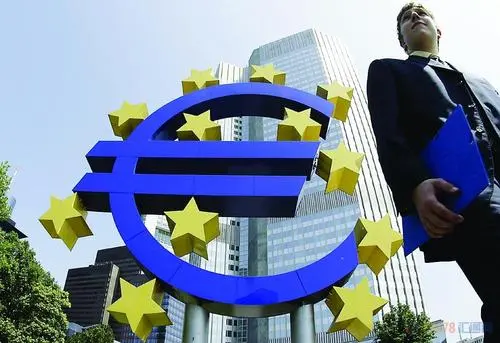
Since the crisis in Ukraine, various factors such as energy difficulties, economic downturn, and inflation have combined to continuously increase the cost of living in many European countries. A recent survey by European payment companies shows that over half of people in Europe are using more discounts and coupons than before, seeking better value for money products. This indicates that in the context of high inflation, European consumers are striving to control their spending. At the same time, the policy effect of the European Central Bank's continued interest rate hikes is ongoing, and the inflation rate in the eurozone has recently shown a significant decline. However, the drag of high interest rates on the eurozone economy is also gradually becoming apparent. With the stagnation of economic growth in the major economies of the eurozone, the European economy has noticeably stalled, and the risk of falling into recession among the world's major developed economies has increased, making it difficult to achieve a "soft landing".
High inflation is causing European consumers to struggle to control spending
According to data released by the German Federal Bureau of Statistics on November 8th, the inflation rate fell to 3.8% in October, the lowest level since August 2021. In that month, food prices in Germany increased by 6.1% year-on-year, while energy prices decreased by 3.2% year-on-year. Excluding energy and food price factors, the inflation rate for the month was 4.3%. In addition, prices in the service industry increased by 3.9% year-on-year. The Director of the Federal Bureau of Statistics, Rut Brand, stated in a statement that although inflation continues to decline, it is still at a high level and consumers are still feeling the pressure of rising food and energy prices. The preliminary statistical data released by the Eurostat earlier showed that due to the impact of lower energy prices and the European Central Bank's interest rate hike, the inflation rate in the eurozone in October was calculated at an annual rate of 2.9%, lower than the 4.3% in September and the lowest level in more than two years. The inflation rate has been consistently high, and the latest September Eurozone consumer expectations survey released by the European Central Bank shows that Eurozone consumers have raised their short-term inflation expectations. In terms of income and consumption, Eurozone consumers in September expected their nominal income to increase by 1.2% in the next 12 months, which is consistent with August. The expectation for nominal expenditure growth in the next 12 months has increased from 3.3% in August to 3.4%. Moreover, Eurozone consumers' expectations for the next 12 months' unemployment rate have risen to 11.4%, higher than the previous month's 11.1%.
The Vice President of the European Central Bank stated that inflation may temporarily rebound
At a banking conference held in Frankfurt, Germany on the 13th, European Central Bank Vice President Luis de Gindos stated that despite tightening interest rate policies, the inflation rate in the eurozone may temporarily rise again in the coming months. The cardinality effect will also play a role in it. This is because the significant increase in energy and food prices in the autumn of 2022 is no longer within the calculation range. But we believe that the overall process of deflation will continue in the medium term, "said De Jindos when discussing the downward trend of inflation. The inflation rate in the eurozone has dropped from 4.3% in September to 2.9% in October. In contrast, in the autumn of 2022, the inflation rate sometimes still exceeded 10%. Given the intensification of geopolitical tensions and the impact of fiscal measures, energy prices remain the main source of uncertainty, "De Jindos said. At the December interest rate meeting, the European Central Bank will obtain new economic and inflation forecasts from its own economists. At that time, the European Central Bank will have more data and a clearer understanding of the impact of previous interest rate hikes on the economy. This will enable us to better reassess the inflation outlook and necessary monetary policy measures, "said De Jindos. De Jindos believes that a resilient and well functioning financial system is crucial for monetary policy to work and for the European Central Bank to achieve its 2% inflation target. For the banking industry, the current uncertain situation means that regulatory requirements for crisis mitigation should not be affected. The economic outlook in Europe is not optimistic
In order to alleviate the negative impact of high interest rates on the economy, after 10 consecutive interest rate hikes, the European Central Bank decided to maintain three key interest rates unchanged at its monetary policy meeting held on October 26th. Analysis suggests that this move is a response to the decline in inflation rates in the eurozone and current market uncertainty. Within the European Central Bank, suspending or lowering interest rates is becoming a hot topic. Some people believe that high interest rates should be maintained for a period of time to fully reflect the lagging effect of interest rate hikes, while others demand interest rate cuts to boost the economy. However, under the pressure of economic recession, there is not much time left for the European Central Bank to balance inflation and growth.
Despite concerns within Europe about a technological recession, some international institutions seem to have stronger confidence than Europe. The International Monetary Fund recently stated that "the outlook for Europe is a soft landing, with inflation gradually decreasing". However, from the situation of major developed economies such as the United States, Japan, and Europe, the European economy is not only inferior to the United States, but also somewhat struggling compared to Japan. There may be more factors to boost optimism about the European economy.

報告顯示,中國電力投資加速增長,預計2024年電網基建投資將超過5300億元。
近日,市場迎來了一則引人注目的消息:工業巨頭3M公司(MMM.N)在本周五公布了其季度業績報告,隨後股價飆升至近兩年來的
最近,外媒給OpenAI算了筆賬,今年可能要血虧50億美元。
近日,巴黎奧運會和世界鐵人三項協會聯合發布了一項重大決定,宣布因塞納河水質污染問題,原定於近期進行的奧運會鐵人三項首次下
當地時間7月18日,法國巴黎發生了一起令人震驚的持刀襲警事件。
近期,一則重大消息在國際舞臺上引起軒然大波,馬來西亞宣布加入金磚國家。
調查發現,互聯網和智能手機的使用幹擾了韓國近五分之一學生的生活。